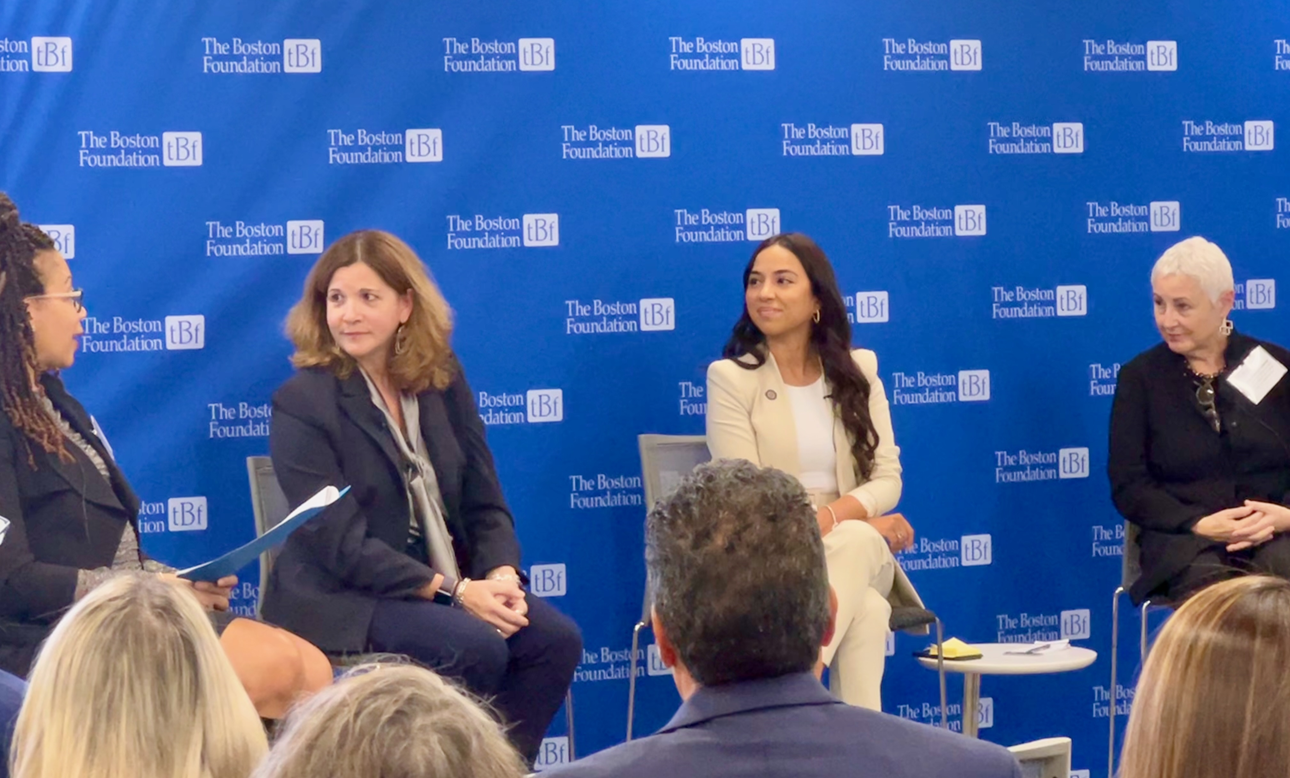Investing in the Latino Pipeline
Last night, as we celebrated the end of Hispanic Heritage Month – the Latino Equity Fund hosted A Portrait of Latinos in Massachusetts: Changing the Narrative. It was a chance to connect with friends and recognize some remarkable leaders, with a wonderful panel featuring Massachusetts Labor and Workforce Development Secretary Rosalin Acosta, philanthropic advisor and climate change strategist Mary Skelton Roberts, and a rising political star, Chelsea City Councilor Judith García, plus author Diana Campoamor, whose latest work If We Want to Win: A Latine Vision for a New American Democracy, brings together twenty leading figures involved in issues that affect the Latinx community, to lay out a vision for the future of American democracy. It was an inspiring event, that reminded us both of our potential political power and the critical issues we use that power to address.
The recent ¡Avancemos Ya! report from Boston Indicators and the Mauricio Gastón Institute for Latino Community Development and Public Policy at UMass shed renewed light on the significant economic, educational, and social barriers to success for people of color in Massachusetts. The findings are hardly surprising - a disproportionate share of the more than 800,000 Latinos in Massachusetts today experiences poverty and food insecurity, with low rates of intergenerational economic mobility, and the pandemic only served to exacerbate some of these longstanding challenges. But to see the data should serve as a stark reminder of what needs to be done.
Massachusetts has long fallen short in facilitating economic prosperity for communities of color. The often-cited Boston Fed report, The Color of Wealth, is best known for its $8 median household wealth figure for Black Bostonians, but the data for other non-white groups was not much better. Across the board, Black and Latino-led households had wealth that was magnitudes lower than that of white households. While that report is getting a welcome and important update, there is reason to act now to tap one of Greater Boston's most important and overlooked assets—the hundreds of thousands of Latinos who call the region home.
Between 2010 and 2020, U.S. census data indicates Massachusetts experienced a 7.4 percent increase in its overall population. Of these new residents, 41 percent are of Latino origin and accounted for 80 percent of Boston's total growth between 1980 and 2020. As the ¡Avancemos Ya! report shows, our region's Latino population is unique—more Dominican, Puerto Rican, and Central American than Latinos nationally. Spread across the state, in Gateway cities like Holyoke, Lawrence, and Lynn, they are a critical resource of entrepreneurial talent. At a time, when we face an unprecedented labor shortage across multiple industries in Greater Boston's economy.
To date, though, this pipeline of Latino talent has been a squandered resource. Historically, the industries with the highest concentrations of Latino workers have offered lower wages. Additionally, these industries rarely offer competitive non-wage benefits, are prone to employment disruption, and were hit hardest by the COVID-19 Pandemic.
Our failure to invest effectively in ESOL and bilingual education and training is evident in national education assessments, where Latinos lag behind Black and white students in Massachusetts in state-by-state rankings of achievement. We can see them in the continuing struggle to find funding for quality workforce-focused ESOL programs, despite research that shows investing in such programs has an almost immediate payback.
Thus, improving the educational pathways for the success of Latino students must be the priority and will set up lifelong foundations that will serve individuals as they progress through high-skilled careers of their choosing.
Current and future political leaders must also make it a priority to advance the competitiveness of the Latino workforce and business. Today, Latinos establish more businesses per capita than any other ethnic group in the U.S. Even so, there is room to grow, as Latino business ownership still trails far behind the overall demographic percentages. Meanwhile, white entrepreneurs are more likely to secure larger amounts of capital at lower rates than other groups.
The irony is that perpetuating the racial wealth gap has cost all of us. Achieving parity in entrepreneurial investment would create over 700,000 new enterprises adding 6.6 million jobs to the U.S. economy. Closing that gap requires investment, and a shift to a more equitable partnership-centric economic model, where Latinos are not only at the table, but share equal stature, decision-making power, ability to allocate resources, and can develop policies that create a climate of prosperity for their families and the communities they live in.
The influx of pandemic relief funds and the shifting dialogue on race and justice gives us the opportunity to invest in education, child care, innovative workforce training, and other areas that can serve as a springboard for closing the racial wealth gap and breaking the cycle of disinterest and investment that is holding back what could be a powerful engine for growth. ¡Avancemos Ya! is a call to action—let's move forward. In Massachusetts, the time to move is now.
Aixa Beauchamp is the co-chair of the Latino Equity Fund at the Boston Foundation.
